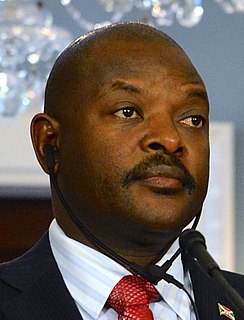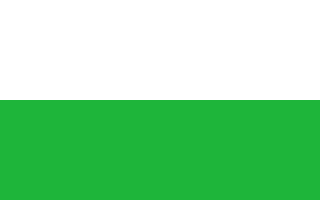Nkurunziza re-election controversy
The ruling CNDD–FDD and the opposition disagreed over whether President Pierre Nkurunziza was eligible to run for a third term in office. [2] Allies of Nkurunziza claimed that he was eligible for a third term, as his first term began after being elected by Parliament rather than a popular vote, and so was not included in the term limit. [3]

The National Council for the Defense of Democracy–Forces for the Defense of Democracy is the current ruling party in Burundi. During the Burundian Civil War, the CNDD-FDD was the most significant rebel group active and became a major political party in Burundi. In March 2012, Pascal Nyabenda was elected as President of CNDD-FDD. Then on 20 August 2016, General Evariste Ndayishimiye was, in the extraordinary congress that took place in Gitega, elected as the Secretary General of the Party.
During a two-day visit to Burundi in March 2015, Tanzanian President Jakaya Kikwete warned of a risk of violence if the constitution and the 2005 Arusha Peace Agreement is not adhered to. The Roman Catholic Church, which is followed by two-thirds of Burundians and also played a key role in the peace talks, expressed concern as well, insisting that the constitution barred Nkurunziza from running for another term. [4]

Jakaya Mrisho Kikwete was the fourth president of Tanzania, in office from 2005 to 2015. Prior to his election as president, he was the Minister for Foreign Affairs from 1995 to 2005 under his predecessor, Benjamin Mkapa. He has also served as the chairperson of the African Union in 2008–2009 and the chairman of the Southern African Development Community Troika on Peace, Defence and Security in 2012–2013.

The Constitution of Burundi was adopted by referendum on February 28, 2005 and promulgated on March 18, 2005.
In April 2015, the CNDD–FDD nominated Nkurunziza as its candidate. The decision prompted days of protests and clashes with police in Bujumbura. The government denounced the unrest and accused the opposition of trying to reignite the violence and ethnic tensions of the civil war. [5]

Bujumbura, formerly Usumbura, is the former capital, largest city and main port of Burundi. It ships most of the country's chief export, coffee, as well as cotton and tin ore. It is on the north-eastern shore of Lake Tanganyika, the second deepest lake in the world after Lake Baikal.
On 5 May 2015 the Constitutional Court ruled that Nkurunziza was eligible to stand for a third term, although its ruling followed the court's Vice President Sylvere Nimpagaritse fleeing the country, saying that most of the court judges believed that Nkurunziza standing for a third term was unconstitutional, but that they had come under pressure to change their minds. [6] On 13 May a coup attempt was launched by elements in the military opposed to Nkurunziza's third term bid, but loyalist soldiers reasserted control by the next day.
The African Union and the United States both called for Nkurunziza not to stand for a third term. [7] On 19 May, following a meeting of regional leaders, South African President Jacob Zuma called for the election to be indefinitely delayed. [8]
On 27 May, the government urged citizens to donate money to help finance the election, reacting to the possibility of foreign aid being cut by saying that the vote would be held regardless. [9] On 31 May, regional leaders of the East African Community called for the election to be delayed by six weeks. [10] While the Burundian government responded positively, protesters were angry that the EAC said nothing about Nkurunziza's candidacy. [11]
On 8 June 2015, the electoral commission proposed that the date of the presidential election be moved from 26 June to 15 July, delaying the vote by nearly three weeks. [12]
Nkurunziza began his re-election campaign at a rally on 25 June. [13]
On 11 July 2015, in response to requests from regional leaders, the government announced another delay, pushing the vote back by six days to 21 July. Although the regional leaders had requested a delay to 30 July to allow time for a potential mediation effort coordinated by the President of Uganda, Yoweri Museveni, the government pointed to the constitutional requirement that the vote be held no later than 26 July, one month prior to the expiration of Nkurunziza's term. [14] With the election only days away, the mediation effort was largely unsuccessful. Museveni acted as mediator for one day and then placed the Ugandan Minister of Defense, Crispus Kiyonga, in charge of the effort. Government representatives did not attend the talks on 19 July, and they were consequently suspended. [15]
Opposition
In December 2014 it was announced that eight opposition parties would field a joint candidate for the presidential elections, as well as running together in the parliamentary elections. [16]
On 10 June 2015, various opposition leaders called for a boycott of the election, rejecting the notion of holding the vote amidst ongoing protests and controversy regarding Nkurunziza's re-election bid and complaining that the election should have been delayed further, especially in light of the EAC's call for a six-week delay. [17]
17 opposition parties announced on 26 June that they would boycott the election. [18] With the entire opposition, including key opposition candidate Agathon Rwasa, calling for a boycott, United Nations Secretary-General Ban Ki-moon called for another postponement on the same day, "in order to create a conducive environment for inclusive, peaceful and transparent elections", and he urged dialogue between the government and the opposition. [19] Albert Shingiro, Burundi's Permanent Representative to the UN, rejected the notion of postponing the vote again. He argued that it was constitutionally necessary to hold the vote as planned and that to do otherwise would mean an "institutional vacuum", and he said that it would be unacceptable for the overwhelming majority of voters to be held "hostage" by a small "radical minority" who opposed holding the election on schedule. [20]
Although the opposition candidates pulled out of the race and called for a boycott, their names remained on ballot papers. [21]














